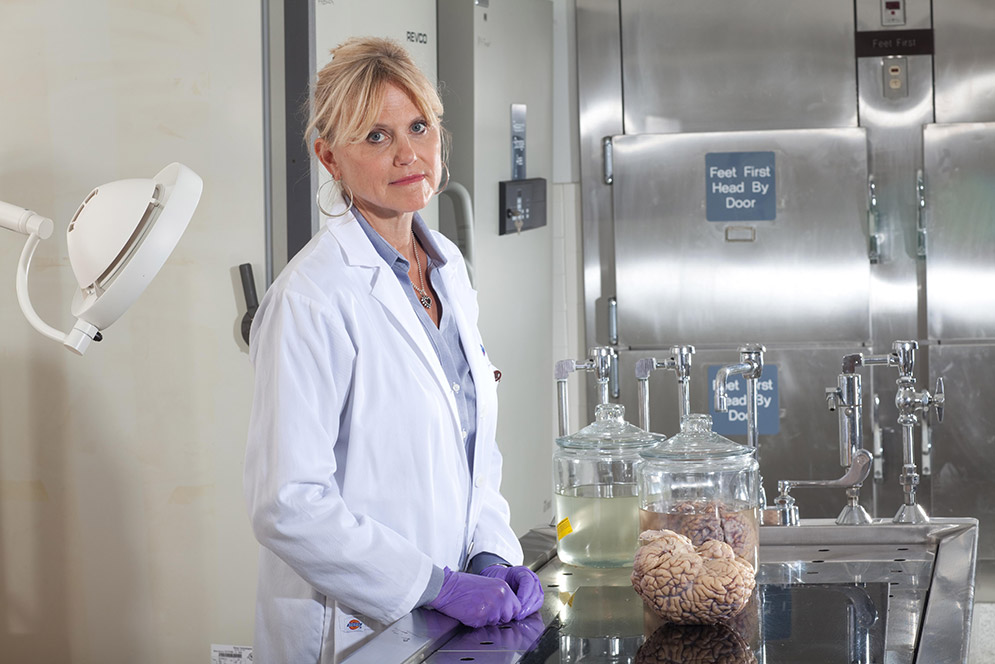Court Rules for BU, against NHL in CTE Case
League had sought research records on degenerative brain disease

Ann McKee, director of BU’s CTE Center, told a federal judge that complying with an NHL request for the center’s data would take years. Photo by Asia Kepka
Boston University’s Chronic Traumatic Encephalopathy Center won a court victory late Wednesday when a US District Court judge in Minnesota denied a request for its records made by the National Hockey League. The NHL sought the records for defense in a lawsuit brought against the league by more than 100 former players seeking medical benefits, alleging that the NHL should have known about the risks of cognitive illnesses like chronic traumatic encephalopathy (CTE). The University argued successfully that a requirement to fulfill the request could discourage scientific research.
The NHL last year sought to subpoena documents about the center’s bank of roughly 400 brains and spinal cords of hockey players, other athletes, and nonathletes. The brain bank has enabled the center’s pathbreaking research into CTE, a degenerative brain disease associated with dementia and mood changes and found in athletes and others who suffer repeated concussions and head trauma.
In her decision, Judge Susan Nelson called the league’s information request excessively broad. That request covered an array of documents, including those identifying all athletes who donated or have agreed to donate their brains; pathology photographs; all CTE-related discussions, prior to publication, with peer reviewers and others; and autopsies and death certificates. BU countered that the request threatened to invade the privacy of brain donors and their families and argued that compliance might deter future donors from working with the center, chilling its research.
“Given the extraordinary breadth of the NHL’s subpoena, the record demonstrates a significant, overwhelming burden” on BU, the judge wrote. “Even setting aside BU’s valid concerns regarding the potential chilling effect of complying with the subpoena, the sheer effort in physically locating and preparing the requested information is staggering.”
Center director Ann McKee, a School of Medicine professor of neurology and pathology, told the court that the center makes 172,000 photographs of each of its 400 brains and spinal cords, with each photo identifying its corresponding autopsy. To eliminate that identification in all the photos and maintain privacy, she told the court, would take 10 minutes per photo—13 years in total.
The University agreed to provide the league with records of six former hockey players whose families had authorized release of their information, Nelson wrote.
“Judge Nelson’s decision balanced the competing needs of the NHL and Boston University’s CTE Center,” says Lawrence Elswit, BU associate general counsel. “The court concluded that the NHL’s subpoena was overbroad and excessive, and that compliance would impose an unreasonable burden on the CTE Center. Implicit in the decision is the court’s recognition that invasive subpoenas like the one issued by the NHL can disrupt scientific research.”
Center clinical research director Robert Stern, a MED professor of neurology, neurosurgery, and anatomy and neurobiology, says the decision “is not just a victory for BU’s CTE Center, it is a victory for scientists everywhere.”
In court papers, BU called the NHL’s subpoena “a step-by-step accounting of the nature of every researcher’s scientific inquiry into the study of CTE, complete with examples of findings involving individuals (or their families) who were given every expectation of privacy.”
The University argued that its privacy agreement with donors’ families would require the removal of all identifying information on records that were released, a task that would be prohibitively time-consuming.
The judge noted that Stern had said complying with the subpoena would “harm all ongoing CTE-related research” at BU and other institutions that collaborate with the University or rely on its work. A Washington University School of Medicine scholar attested to that, the judge wrote.
The NHL had argued that BU’s research touched on “understanding what could have been scientifically known about head injuries and CTE at different points in time,” information relevant to the league’s defense against the players’ suit.
But Nelson said prepublication information was unnecessary to its defense, as “the NHL could not have known about possible causal links between head injuries and CTE based on information in unpublished research.” She also cited other courts’ decisions that frowned on the handing over of “prepublication academic research,” especially in cases such as BU’s, where the University is not a party to the players’ suit against the league.
Nelson’s decision, Elswit says, “adopted the University’s position and does not require the production of additional information that is entirely irrelevant to the issues in the lawsuit.”
Comments & Discussion
Boston University moderates comments to facilitate an informed, substantive, civil conversation. Abusive, profane, self-promotional, misleading, incoherent or off-topic comments will be rejected. Moderators are staffed during regular business hours (EST) and can only accept comments written in English. Statistics or facts must include a citation or a link to the citation.